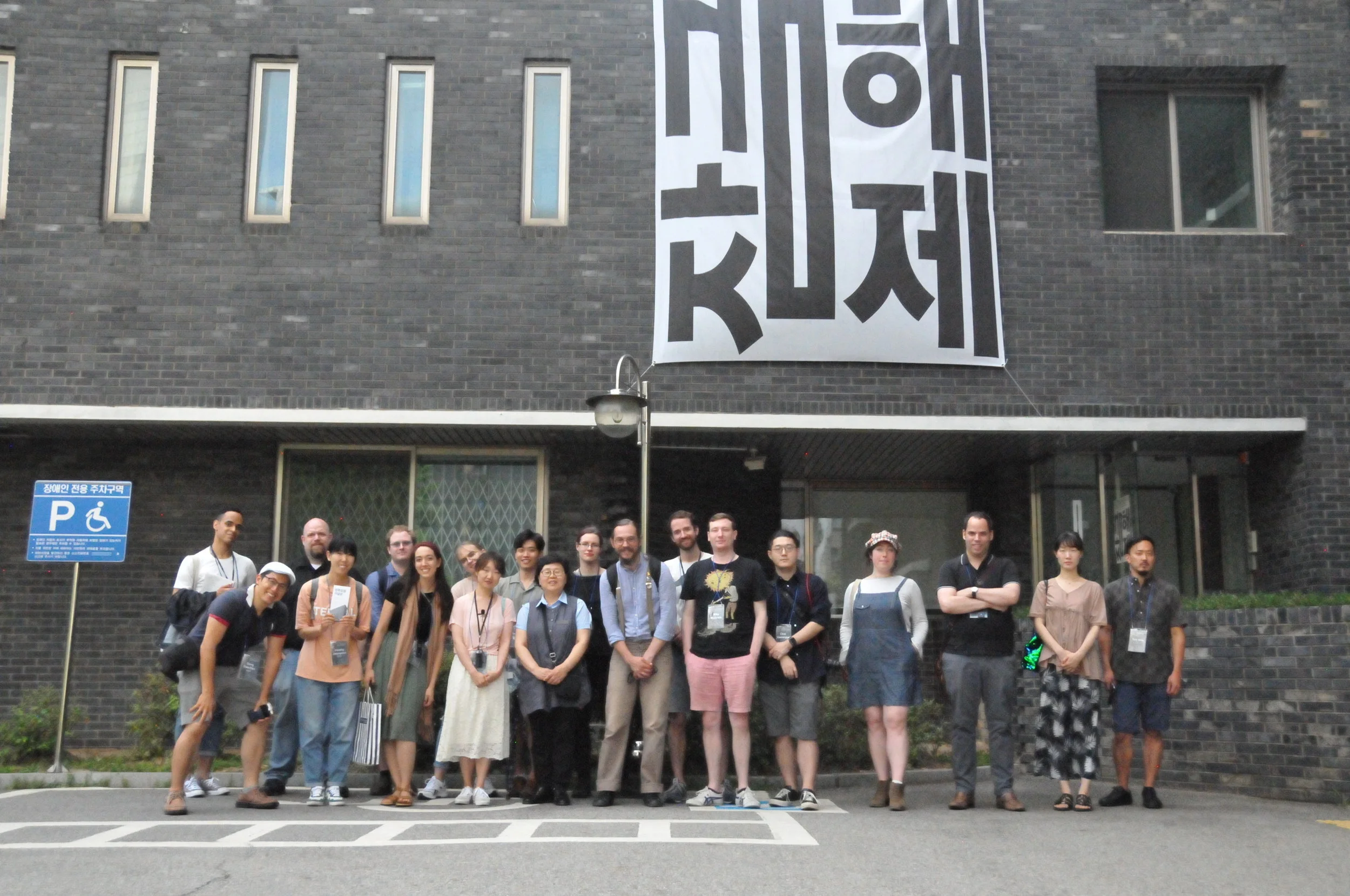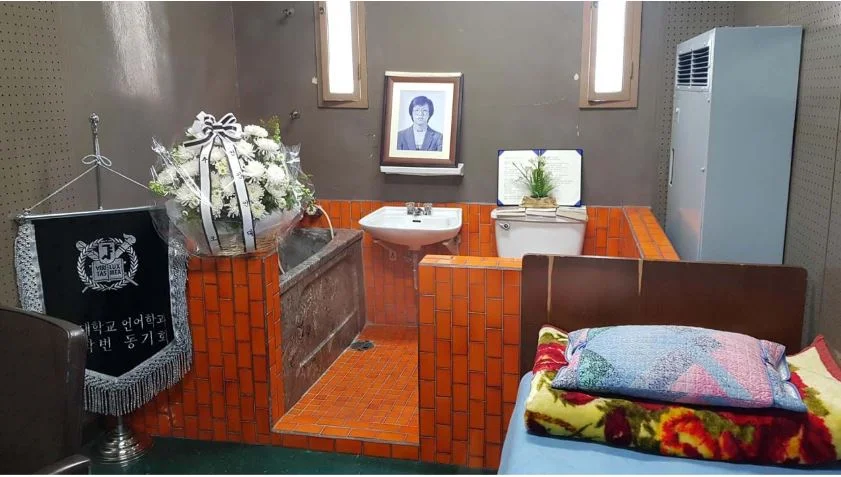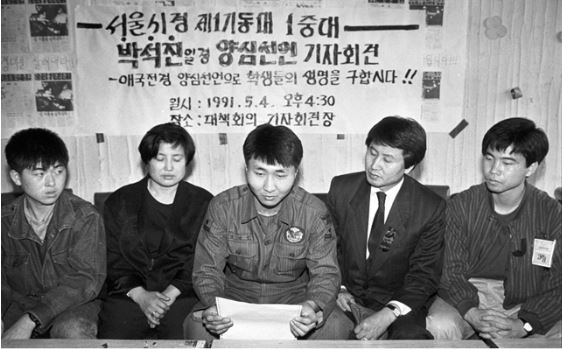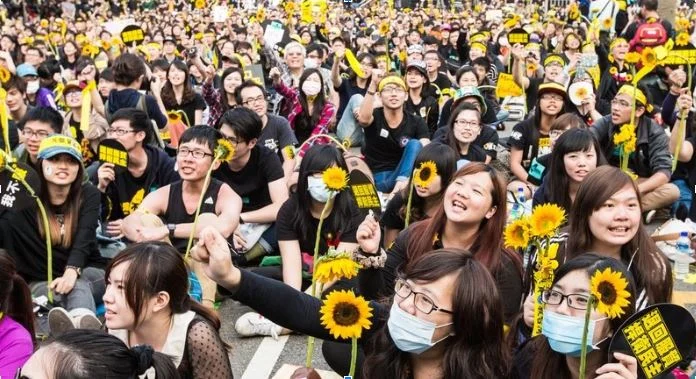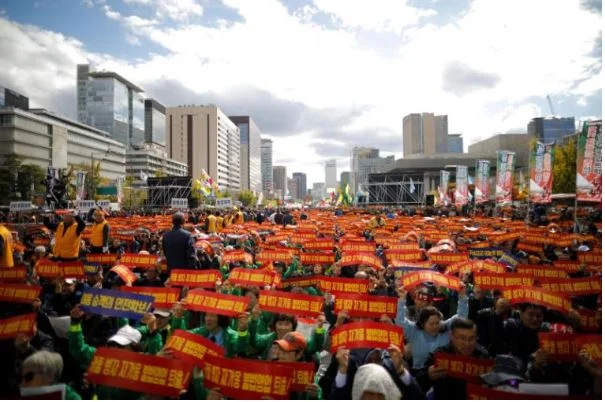This summer, after two decades, I finally made the trip back to Palestine to visit my extended family, to connect with the land, and renew my understanding of what life is like on the ground for the millions of Palestinians who continue to live under Israel’s unjust and illegal occupation.
Read MoreJuly 27th marked the 70th year anniversary of the 1953 ceasefire to the Korean War. In the three years leading up to the anniversary, South Korean peace movements organized the international campaign Korean Peace Appeal to end the Korean War with a peace treaty. Yet, the anniversary has come and gone and peace is nowhere on the horizon. In fact, rather than working towards defusing tensions in the Korean Peninsula, the Biden Administration is using North Korea as a cover for building a NATO-level trilateral alliance with South Korea and Japan against China.
Upon taking office, when South Korean President Yoon Seok-yeol sidestepped claims for historical accountability of Japanese colonialism, he cleared the way for the US’s regional “cornerstone” (Japan) and “linchpin” (South Korea) to connect with each other. In the process, they overcame the US’s roughshod San Francisco system, which had sacrificed justice against Japanese colonialism at the altar of anti-communism. On Aug. 18, to immunize the trilateral alliance from changes in administration, at Camp David, Biden, Yoon, and Kishida announced the “Spirit of Camp David” which would institutionalize annual trilateral summits, meetings, and consultations.
On Aug. 28th, to explore the state of South Korea’s peace movement and the tasks ahead for it, I met with Francis Dae-hoon Lee, a long-time peace activist and veteran of Korea’s democratization movement and a Professor of Peace Studies at Sungkonghoe University and Director of Peacemomo, a research institute for peace and education. The interview has been edited for clarity and brevity.
Read Moreeishi Hinada is a National Executive Committee member of ZENKO (National Assembly for Peace and Democracy). ZENKO emerged in 1970 out of the student movement in the 1960s. He joined in 1981 as a university student activist in the anti-nuclear peace movement in Hiroshima.
Read MoreOn May 1, May Day, a construction worker set himself on fire. The crackdown of the construction union by the Yoon Suk-yeol administration drove Yang Hoi-dong to his death. His death is the social murder of the Yoon Suk-yeol government.
Illegal multi-level subcontracting is rampant, and delayed/unpaid wages ongoing. Construction workers who have struggled to change construction sites, which relegate worker safety to the background, demanding to be treated with respect as workers and technicians, are being cornered as/ turned into criminals accompanied by extortion threats at regular intervals. Since January of this year, there have been 13 seizures and searches, 15 arrests, and 950 union members subpoenaed for investigation. The massive crackdown against the construction union has taken the life of the martyr.
Vijay Prashad is an Indian historian, journalist, and editor. He has written over 20 books including ‘The Darker Nations: A People's History of the Third World’, ‘Red Star Over the Third World’, and ‘Washington Bullets’, which was translated by the ISC. He is director of the Tricontinental: Institute for Social Research that recently published another work that was translated by the ISC, ‘Washington’s New Cold War: A Socialist Perspective’.
Vijay came to Korea for three days in early December to give a series of talks about the new cold war and other issues affecting the world. We met Vijay on his third afternoon in Seoul for a conversation about organizing and the importance of growing the left domestically and internationally.
Read MoreAccidents can occur in any form in our shared spaces of life and work. However, in cases where the accident could have been prevented in advance, yet people are killed from the neglect of corporations or the state, those cases are not accidents but murder. And if there are a large number of victims of the disaster, how is it any different than a massacre?
Read MoreOn Sept. 4th, 62% of voters rejected a new Constitutional proposal that would have replaced the existing Pinochet era one. To examine why the constitutional proposal was rejected and the tasks ahead for Chile’s left, on Oct. 27th, Dae-Han Song interviewed activist, politician, and journalist Taroa Zúñiga Silva for the ISC Progressive Forum.
Taroa Zúñiga Silva is a journalist for Globetrotter. She is also the co-editor of "Venezuela, Vortex of the War of the 21st Century" and a coordinating committee member of Argos, Observatory for Migration & Human Rights, and the co-founder of the Venezuelan Faldas-r collective for women's sexual and reproductive rights. This interview has been edited for clarity and brevity.
Read MoreEver since World War II, the US has waged war on countries and the world’s people to build its global capitalist empire. The US spends more on its military than the next 7 countries combined.
Read MoreOn June, Seoul’s High Court ordered Japanese companies to pay reparations to forced laborers under Japanese colonization. In response, in July, Japan imposed restrictions on export of three chemicals crucial to the manufacture of Korean semiconductors.
Read MoreOn Aug. 20, as part of the International Progressive Politics Forum at the Seoul Justice Party, we had a video conversation with Vijay Prashad, author of several books and articles, notably “Darker Nations: A People’s History of the Third World” and “The Poorer Nations: A Possible History of the Global South.”
Read MoreIt was eerily beautiful as we walked along the fortress wall of the Democracy and Human Rights Memorial building. It was peaceful standing beneath trees that hung over the security gate as we were introduced to the place where we stood.
Read MoreI had the opportunity to attend two back to back events by the ISC about democracy and human rights in downtown Seoul, South Korea. Sounds boring right? However, these events were engaging and new for two reasons.
My first visit to Cuba was in July 2017. Like the millions inspired by its revolutionary spirit and history, I fell in love with this powerful place and its people. Since then, I’ve organized several delegations and educational exchanges to Cuba with Black and Brown organizers, farmers, artists, educators, and healers from the United States.
Read MorePreviously, in Nov. of 2018, the South Korean constitutional course ruled that a conscientious objector must be provided with an alternative form for fulfilling their military service.
Ya-ting Yang joined the New Power Party in December 2015, ahead of the 2016 elections. Unlike previous third parties in Taiwan, the New Power Party wasn’t born out of a split with another party..
Read MoreWhat does it mean to stand in solidarity with workers? For the taxi drivers calling out for recognition of their struggles, this is a key question and an opportunity to question how our current economic system is changing.
Read MoreThe purpose of our event was to provide a space to expose and correct the distortions and media blackout of the reality in Venezuela. We explored how to understand Venezuela amidst the media attacks, threat of military intervention, and economic sanctions.
Read MoreDie Linke which translates as “The Left” is Germany’s left/progressive party. It was founded in 2007 incorporating political strands from West Germany (those dissatisfied with the Social Democrats) and East Germany (former members of the then ruling Socialist Unity Party of Germany).
Read MoreElectoral systems have their pros and cons. If you have a proportional system, the parties have a strong role because the parties decide who will be the leading candidates and the order of the lists.
Read MoreThe participation of citizens in public management and political dynamics is one of the fundamental pillars of the 5-Stars Movement. Since the beginning, our goal has been to bring citizens into institutions as well as to bring institutions closer to citizens.
Read More








